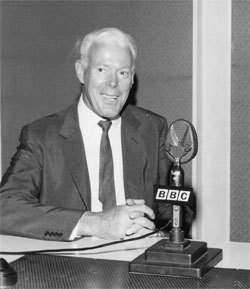Music Listening in the Twentieth Century February 1987
Trevor Leggett was head of the Japanese Department of the BBC.

This is one of his broadcasts to Japan
Zubari reserved for February 1987
Hello listeners – today I am going to say something about the music which 20th century man likes to listen to. If we look at the programmes of the concerts in London, we find something surprising. London is one of the greatest centres of music in the world. Every day, there are two or three major concerts. Then there are smaller ones – sometimes at lunch time in churches, and small halls.
The surprising thing is: the music that is mostly played is not 20th century music. It is 19th century and 18th century music, and some from even before that. This is the first century when the musical public has not wanted to listen to the music of its own century. In the 19th century, for example, the public wanted to hear the latest works by the musicians of the time – Wagner, Tchaikovsky, and so on.
In the 18th century, people wanted to hear the latest symphony by Mozart. There were no “classics” then; the pianists played their own compositions. But in this 20th century, people want to hear old music, [generally] pieces musically much simpler and serene and strong.
Sometimes these very old pieces have been arranged for modern instruments. But still they sound calm and attractive.
Listen to this piece by Vivaldi, who died in 1743. How simple, and attractive, it is! No one can compose like this today. It is being played by modern instruments – violin and piano – but the music somehow breathes the atmosphere of those days.
RECORDING: CONCERTO IN C MAJOR in the style of Vivaldi (by Fritz Kreisler)
How beautiful it is! Simple, and yet perfectly balanced and calm; also lively in places.
No one could compose like that today. But suppose someone did? No – we think, no one could compose like that today.
Well, as a matter of fact – that piece just played was composed by the great violinist Fritz Kreisler in 1930. He published it as by Vivaldi, and people liked and admired it. Some other violinists played it. Then it was discovered that it was not by Vivaldi, and Kreisler admitted that he had composed it himself. After that, people did not admire it, and hardly anyone played it.
The music was the same, but the name of the composer was different.
Now listen to it again. How ordinary and uninspired it sounds now, doesn’t it?
I leave it to you to judge.
RECORDING: Vivaldi-Kreisler again
[Please note that the following piece – undated – has been added to the above, since the subject matter is similar, until an alternative zubari ‘home’ is found for it.]
I think a good many people were giving up. But some critics persisted in reminding us that the opera singers of Wagner’s day refused to rehearse Tristan, they said it was unsingable, and anyway musically nonsense. When it was finally put on, it was hissed and booed. Yet, in 20 years, it was accepted as a great masterpiece. It will be the same with Schoenberg, they told us. “You are simply old-fashioned,” they said to us, “and in 20 years time you will be applauding him.”
No one likes to be thought old-fashioned, particularly when one is only fifteen.
But today, 70 years after the composition of Pierrot Lunaire we are not applauding it. It is hardly ever performed, and when it is, hardly anyone goes to hear. The same applies to Schoenberg’s other works in the famous ‘twelve tone’ style. There are still some passing gestures of respect, but in fact people do not like these works, not even musicians like them. The ‘giant of the 20th century’ has turned out to be no giant.
A hundred times more music is being played and heard than ever before, thanks to the radio and the tape recorder; in all the developed countries, anyone who has any talent has the opportunity to develop it. Yet…. no undisputed geniuses. Beethoven, Bach and Wagner were honoured during their lifetimes, and still more within twenty or thirty years after their deaths. But here we are, four-fifths of the way through the Twentieth Century, and we do not like to listen to the Twentieth century composers.
What has gone wrong?
© Trevor Leggett